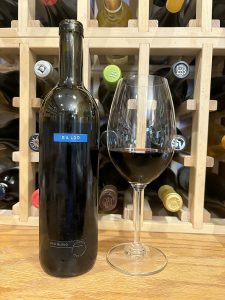Deep ruby color; plum, black cherry, cassis, oak, cedar, smoke, vanilla, espresso, spice on the nose and palate.

Dry; big and bold, but reserved tannins as zinfandel is the lead grape in this blend. Some acidity. Full body. Velvety, lush mouthfeel. Illusion of sweetness from very ripe grapes and high alcohol. The Prisoner does not precisely present the blend for this vintage, but typically it has been 85% zinfandel with dollops of petite sirah, syrah, and cabernet sauvignon. Grapes come from Dry Creek, Lodi, Amador vineyards—and from “here and there.” “Saldo” means “here and there” in Latin. This focuses on rich, dark fruit deliciousness rather than subtly or complexity. 15% ABV
Saldo achieves a dependable profile each year. My tasting impressions are consistent with previous vintages, although this is 15% ABV—less than previous efforts. For the third straight vintage—and third effort by winemaker Chrissy Wittmann—Saldo is slightly less jammy than earlier iterations. Delicious, easily approachable crowd pleaser.
The Prisoner Wine Company consistently delivers amicable, fruity, phenolically sweet wine. The brand became a wine industry giant using that formula. It all began with a zin-led red—The Prisoner—created by Orin Swift Cellars founder Dave Phinney in 1998. Phinney grew The Prisoner brand from 385 cases to 85,000 cases in 10 vintages, a major wine success story.

Phinney sold The Prisoner brand to Huneeus Vinters in 2010, and Huneeus sold to Constellation Brands in 2016. Bill Newlands of Constellation said at the time of the acquisition: “More than ever, consumers are seeking high quality, distinctive wines, and the portfolio we are acquiring from The Prisoner Wine Company delivers.”
Phinney sold his Orin Swift Cellars brand to E.&J. Gallo in 2016. Since The Prisoner was a separate brand from Orin Swift, Phinney has now sold his brands to the largest publically-traded wine company in the world: Constellation. And to Gallo, the largest family-owned wine company in the world. Selling to both was pretty nice trick for Phinney.
Constellation paid $285 million for The Prisoner Wine Company, and that was just the brand, no vineyards came with the purchase. The wine world is cleaving into two camps: wineries that make a precise, consistent style of wine (The Prisoner Wine Company is an example), and wineries that express a particular plot of land and the terroir elements that go into that equation. Wine drinkers can sit back and enjoy while debating the existential nuances of each approach.

Chrissy Wittmann is the winemaker at The Prisoner today. After earning a bachelor’s degree in Ecology and Systematic Biology at California Polytechnic State University in San Luis Obispo, Chrissy found her love for wine while analyzing soil and waste water samples in a lab. She returned to Cal Poly and earned a master’s degree in Agriculture. Waste water vs. wine? Not a hard call.
Wittmann joined Scheid Vineyards in 2005 as assistant winemaker; two years later she joined the prestigious Wild Horse Winery & Vineyards in Paso Robles. Over the next nine years, Chrissy rose to director of winemaking, while mastering the art of multi-vineyard sourcing. In 2016, Chrissy and her family moved to Napa Valley and joined The Prisoner Wine Company, where her expertise in vineyard partnerships is in play every day. Chrissy says, “The Prisoner Wine Company’s wines have true personalities that start in the vineyards and which are encompassed in the blending of the wine. I’m thrilled to be working with so many vineyards of quality, to tap into my inner wine geek every day.”
The Prisoner Wine Company Saldo Red Blend 2019 is a dependable celebration of ripe zin with a supporting cast. Big and powerful, not quite as high alcohol as previous vintages, but still up there are 15% ABV. Works with food, but clearly also is calculated to work as a cocktail substitute. While it may lack the tannin oomph to hang with rich, red, fatty slabs of beef off the grill, it will pleasure many a palate beyond that. Enjoy by itself. Pair with grilled, roasted meats—beef, lamb, pork that are not too marbled, but—heck—will not be a disaster even then. Barbecue—slow cooked brisket, baby back ribs; sausage dishes; dishes with bacon; comfort foods—meatloaf, shepherd’s pie, cheeseburgers, bowl of chili. Cheese—hard, nutty cheeses; aged gouda, parmesan, manchego; soft, bitter—blue cheese, gorgonzola, stilton; emmentaler, brie, camembert. $32
